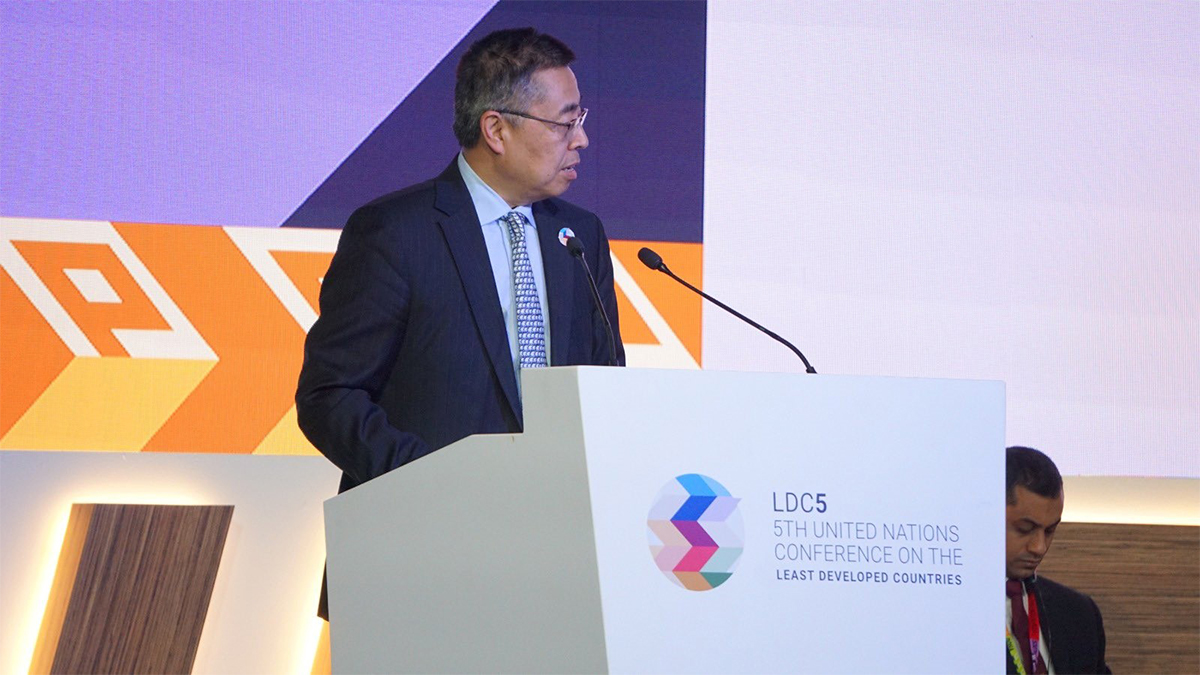A path to prosperity: Harnessing trade to deliver for LDCs
Co-authored with:
Rabab Fatima, UN Under-Secretary-General and High Representative, Office of the High Representative for the Least Developed Countries, Landlocked Developing Countries and Small Island Developing States (UN-OHRLLS)

The 5th United Nations Conference on the Least Developed Countries (LDC5) concluded on 9 March with the adoption of the Doha Political Declaration, which outlines concrete measures to unlock the potential of least-developed countries (LDCs).
International trade offers LDCs a proven route towards sustainable development. It can contribute significantly to building more resilient economies and lifting millions out of poverty in LDCs. This is why trade is a key pillar of the Doha Programme of Action, which maps out commitments between LDCs and their development partners in 2022-31.
Commitments to help LDCs reap the benefits of trade – including better quality jobs, stronger economic growth and increased productivity – are timely. LDCs’ share of global trade has stagnated at less than 1% in recent years. The Doha Programme of Action sets the ambitious target of doubling this share by 2031. The consultations resulted in four key takeaways:
Regional consultations were arranged ahead of LDC5 in two LDCs — Ethiopia and Cambodia — to gain a deeper understanding of how LDCs might boost their exports. Nearly 100 senior trade officials from over 40 LDCs attended these consultations, focusing on their trade challenges, priorities, and ambitions and on the type of support they need.

1. Multilateral cooperation can help LDCs tap opportunities in digital trade
Digital trade represents an opportunity for LDCs to expand their share of global trade. For example, digital platforms offer LDC exporters new opportunities to reach customers in other countries at lower costs.
Multilateral and regional cooperation could help LDCs grasp digital trade opportunities more effectively. For instance, cooperation can enable LDCs to access technical assistance to upgrade their digital trade-facilitating policies and regulations. Potential benefits are significant. LDCs have fewer such policies in place than high-income countries, according to the Digital Trade Integration Project, a repository of regulatory policies pertaining to the digital economy.
Such forums also enable LDCs to voice concerns and advocate for their own interests during the negotiation of trade rules or practices that impact them.
2. LDCs need targeted and nimble capacity-building support
During the consultations ahead of LDC5, LDCs flagged the need for support from the international community to find more effective ways to boost their capacity to trade, especially by reducing trading costs, addressing productive capacity constraints, and participating in global supply chains. Other partner practices that have proven impactful included engaging the private sector and facilitating country ownership.
Future multilateral trade support for LDCs also needs to be more inclusive and fit for purpose. For instance, stronger coordination, with robust monitoring, learning and evaluation capabilities, would ensure nimbler responses to LDCs’ changing needs.
3. Regional integration can help LDCs boost their trade and become more resilient
Deeper regional integration can help LDCs to expand their exports, promote diversification and strengthen the resilience of their economies.
For example, full implementation of the African Continental Free Trade Area (AfCFTA), could result in a 34 per cent increase in inter-African trade by 2045, according to the UN Economic Commission for Africa (ECA). AfCFTA promises to be particularly beneficial for key productive sectors, like agriculture and services, which would help to reduce the reliance of African economies on energy and mining, and provide a buffer against external shocks.
Regional integration is also becoming central to the strategies of Asian LDCs to graduate from LDC status. For example, Cambodia, already a member of the Regional Comprehensive Economic Partnership (RCEP), recently signed bilateral free trade agreements with China and the Republic of Korea. A similar agreement is being negotiated with the United Arab Emirates. In some regions, LDCs are also building regional networks based on preferential trade arrangements that include provisions on digital and sustainable development.
4. LDC graduation and transition strategies require further focus
LDC participants in the consultations prior to LDC5 expressed concerns that some economies graduating from LDC status will, upon graduation, lose trade preferences related to market access. Although some trading partners already grant LDC graduates a transition period to adjust, LDCs would like to see more of their trading partners extending such preferences. They would also like to continue benefiting from LDC-specific special and differential treatment provisions in the WTO.
A sustainable graduation support facility (iGRAD), designed to support a smooth transition for graduating LDCs, was launched at LDC5. Over a third of all LDCs are already on track to graduate from LDC status, and the Doha Programme of Action calls for an additional 15 LDCs to be supported to meet the graduation criteria by 2031. All of this underlines the urgent responsibility of the international community to help LDCs develop comprehensive transition strategies.
The global trading landscape is evolving fast. Tomorrow's trade priorities will not be today's. LDC policymakers need to start exploring new trading opportunities that can increase the incomes and raise the living standards of the billion-strong populations of the LDCs.
